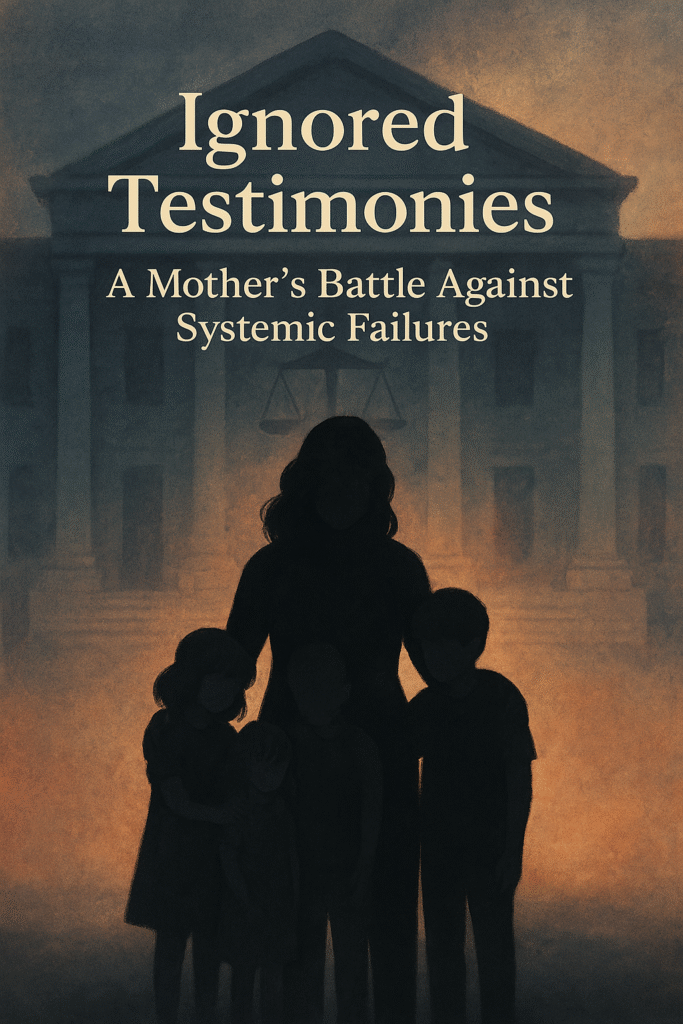Clara’s Story:

A Mother’s Fear and a Court Report That Changed Everything
Clara Mitchell had long feared for the safety of her children. Over several years, she had been entangled in family court proceedings in which a court-commissioned family report would play a pivotal role. The report had been prepared by Dr. Fiona Hart, a single expert witness commissioned by the parties, rather than the Court itself.
While the Court clarified that it could not investigate complaints about externally commissioned reports, Clara and her children felt that Dr. Hart had failed in her professional duty, putting them at grave risk.
Children Left Unprotected by a Report That Ignored Abuse
The Mitchell children—Emma, Lucas, Lily, Chloe, and Rose—had all been affected by decisions made based on Dr. Hart’s report. Clara had tried to voice concerns during the proceedings, but legal constraints and timing issues left her unable to challenge the omissions directly. The family feared that the children’s lived experiences of abuse would be systematically ignored.
Severe Allegations Against Damien Carter
The allegations against Damien Carter, the children’s father, were severe. Clara described incidents of sexual abuse, physical and emotional violence, coercion, and grooming.
She recounted that Damien had forced his children into dangerous and humiliating acts, inflicted harm on family pets, and controlled the children through manipulation and threats. Despite disclosing these traumas directly to Dr. Hart during multiple interviews, Clara and her children later discovered that none of this information had been included in the family report.
Emma’s Story: A Glimpse of Hope, Followed by Betrayal
Emma Mitchell, the eldest daughter, provided a detailed account of her experience. She described a session with Dr. Hart in which she and Lucas had relived years of trauma at the hands of Damien.
Emma recalled that Dr. Hart had expressed astonishment that the children had not previously been interviewed, giving the siblings a brief sense of hope that someone was finally listening. Yet, when the report was filed, none of the children’s disclosures—ranging from sexual abuse and drug-related incidents to threats of violence—were reflected.
Emma emphasized the profound betrayal this caused, leaving her and her siblings feeling disregarded and unprotected.
Lucas’s Evidence: Recordings Ignored
Lucas Mitchell echoed his sister’s concerns. He explained how he had recorded the sessions with Dr. Hart to ensure the children’s testimony was preserved, given the risk that it would be omitted.
He described the same frustration: critical evidence, including a recorded phone call in which Damien coached one of the younger children on what to say to Dr. Hart, was ignored in the final report.
Lucas worried that the omissions would lead the court to issue orders placing the children with an abusive parent, heightening the risk to their safety.
The Consequences of a Flawed Report
Clara described the ongoing distress caused by the report’s omissions. She recounted how the Court’s decisions had led to situations where her children were forced to remain with their father despite the documented risks.
The children had, in some cases, self-placed or run away to avoid further harm. Clara noted that the failure to include the children’s disclosures in Dr. Hart’s report left the family vulnerable and allowed the abuse to continue unchecked.
Emotional Fallout and Reclaiming Power
Clara also reflected privately on the emotional toll this entire ordeal had taken on her. She recognized that she had carried the weight of trauma not only for herself but for her children.
Each session with Dr. Hart had required her and her children to revisit memories they had struggled to suppress, and yet those revelations had seemingly vanished into the pages of a report.
Clara understood that processing this grief required acknowledging the pain without allowing it to define her or her children. She sought small ways to reclaim a sense of control: journaling her experiences, documenting the timeline of events, and setting boundaries with those who sought to minimize her children’s voices.
A Mother’s Quiet Resistance and Acts of Protection
She reminded herself that her role was not to carry the Court’s failures but to advocate for her children’s healing. Clara realized that even when systems failed, her validation of the children’s experiences—listening, believing, and affirming them—was a profound act of protection and resilience.
In private moments, she encouraged her children to express themselves safely, to reclaim autonomy over their stories, and to know that the injustices they had endured were not a reflection of their worth.
Finding Strength in Solidarity
Clara also sought strength in community. She reached out to other mothers who had faced similar challenges, learning from their experiences and finding solidarity.
Sharing the story, even in fragments, became a way of transforming helplessness into action. Clara recognized that while she could not erase the past, she could create a space for truth, safety, and recovery.
The Larger Problem: When Reports Ignore Children
Ultimately, the Mitchell family’s experience highlighted the vulnerabilities of children in family law proceedings when critical testimony is excluded from professional reports.
Despite the Court’s administrative limitations, Clara sought to raise awareness through formal complaints to professional bodies and recorded documentation.
Her story illustrates the tension between legal processes, professional obligations, and the real-world protection of children at risk. It also offers a lesson in resilience: even in the face of systemic failure, the acts of listening, documenting, and believing are powerful tools of healing.
Link to a – National Domestic Violence Hotline